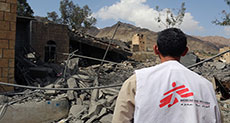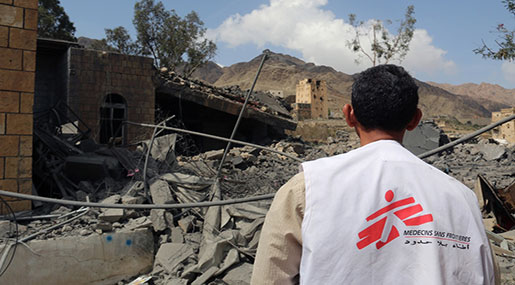
When I Heard Warplanes, I Never Thought Our Hospital Was the Target

One MSF worker describes her struggle to make sense of a bombing in Yemen that left one colleague dead and others wounded
Teresa S Ravina*

For my second ever mission, I was sent to work in a Yemeni village not far from the border with Saudi Arabia, which was surrounded by displaced camps and considered a quiet place. That was until the Saudi led coalition bombed our hospital.
The morning of the bombing, I had been at the hospital for a routine meeting with the hospital director and an employee of the ministry of health, but I was back in the Médecins Sans Frontières [MSF] office, 5km away, when I heard the sound of the Saudi plane flying overhead.
Our coordinates had been shared with all the stakeholders of the conflict, in order to avoid "mistakes" and the hospital building could also be visibly identified by our logo, so I didn't immediately stop what I was doing. But when I finished the interview I was working on and left the room, I realized something was seriously wrong as I found a huddle of colleagues by the main office, all of whose faces showed great concern.
The next few minutes were horrific. The first news we received was that they had bombed within minutes of the hospital, then we heard that they had bombed the entrance of the hospital, and shortly after, that the bomb had fallen on the hospital.
At that moment, everything freezes around you. It's an experience your brain has never had to process before, nothing prepares you for it. You don't feel fear, or panic or sadness. You feel nothing. You just want to know that everybody is ok.
With phones busy or not working at all, it was only gradually that we learned about colleagues. Each time we got through to someone this provided a certain calm. But then there were many fellow workers, patients, children and women, and family and friends who accompanied those who were sick, of which we knew nothing.
When we were assured by our head of mission back in Yemen's capital Sana'a that there would not be more shelling, a team left the office for the hospital to assess the damage. Knowing that news would come slowly, and feeling helpless for not being able to do anything useful at that moment, I went on the internet to see if anyone was reporting the bombing outside our area and to try to work out how long we had to tell our families before they found out from other sources.
What had happened was no clearer online. People on Twitter reported that there was a Spaniard dead as a result of the bombing. However, a few minutes earlier I had heard my colleague talking on the phone with the only Spaniard who was in the hospital. I cannot imagine how I would have reacted to that "news" if I had not heard the phone call.
After the initial reports on social media, it was not long before the attack was picked up by the international media. It seemed unbelievable that the Saudis had bombed yet another hospital in the country. International law and the respect for the humanitarian work had been violated, once more.
What followed next for me was a mixture of immense rage, vulnerability, and the need to do something, to work, to be busy, anything to not have to think, even for a second, about what just happened. Because what my colleagues and I had just lived through was not an action movie, the TV show Homeland or a video game, what we had just lived through is the pure reality of living and working in Yemen.
At the same time, managing these emotions became a battle beyond my control in the days that followed. Was I being too insensitive for not mourning? Or too weak when I did? If I lost the desire to talk or entertain, would others understand? How much do I tell my family? Culpability too, because I do not want to talk to anyone who had not been there.
Later in the afternoon we learned of the death of one of our colleagues, whose body was brought to the office. With him came more colleagues who were at the hospital at the time of the bombing, some of them wounded. I cannot explain the sense of pure helplessness and desolation that lingered in the atmosphere. To see these people that are normally full of energy, professionalism and optimism, in such a state, I felt filled with an indescribable emptiness.
At that time you do not question your personal security, fear doesn't invade you. All this comes days later, only when the adrenaline and exhaustion leaves you. And yet, I do not think that one truly takes in the whole situation, until you are out of the context in which it happened. There's this sense of survival and responsibility, because there is still work to do, and you do not want to turn your back on the people for whom this is a daily reality.
Two days after the bombing we were evacuated to Sana'a for several months. While we continued to support the hospital remotely from the camp, we still struggled with the fact that we had left thousands of displaced people who lacked healthcare. People with psychological trauma due to the bombing, pregnant women at high risk of losing their children during childbirth and many malnourished children.
It was the strength of our Yemeni colleagues that got me through the first days. Even though they were asked to stop activities until security was 100% ensured to all national and international staff, they continued working, without a rest. I took their positivism, which filled me with enthusiasm and energy to return and resume the project. I took all the work done so far, the patients seen and the lives we had saved. And whenever it gets too much, I think of the face of a grateful father when he came to say goodbye to us with his baby on his arms, a baby who was born in the hospital the morning of the bombing and survived.
*Teresa S Ravina is HR and finance manager for MSF in Yemen
Source: The Guardian, Edited by website team
Comments



